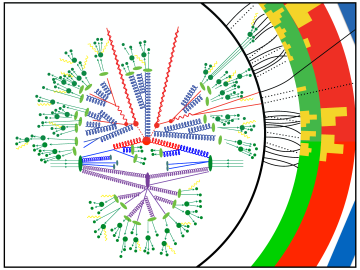
Filter News
Area of Research
- (-) Functional Materials for Energy (2)
- (-) Supercomputing (82)
- Advanced Manufacturing (2)
- Biological Systems (2)
- Biology and Environment (86)
- Biology and Soft Matter (1)
- Computational Engineering (1)
- Computer Science (3)
- Electricity and Smart Grid (1)
- Energy Science (125)
- Energy Sciences (1)
- Fusion and Fission (7)
- Fusion Energy (1)
- Isotope Development and Production (1)
- Isotopes (28)
- Materials (73)
- Materials for Computing (13)
- Mathematics (1)
- National Security (27)
- Neutron Science (19)
- Nuclear Science and Technology (10)
- Quantum information Science (3)
News Topics
- (-) Bioenergy (9)
- (-) Cybersecurity (8)
- (-) Energy Storage (9)
- (-) Frontier (32)
- (-) Isotopes (2)
- (-) Polymers (2)
- (-) Quantum Computing (20)
- (-) Space Exploration (3)
- 3-D Printing/Advanced Manufacturing (5)
- Advanced Reactors (1)
- Artificial Intelligence (37)
- Big Data (22)
- Biology (11)
- Biomedical (17)
- Biotechnology (2)
- Buildings (4)
- Chemical Sciences (5)
- Computer Science (96)
- Coronavirus (14)
- Critical Materials (3)
- Environment (22)
- Exascale Computing (26)
- Fusion (1)
- Grid (5)
- High-Performance Computing (43)
- Machine Learning (15)
- Materials (16)
- Materials Science (16)
- Mathematics (2)
- Microscopy (7)
- Molten Salt (1)
- Nanotechnology (11)
- National Security (8)
- Neutron Science (13)
- Nuclear Energy (4)
- Partnerships (1)
- Physics (8)
- Quantum Science (25)
- Security (6)
- Simulation (16)
- Software (1)
- Summit (43)
- Transportation (6)
Media Contacts

Lawrence Berkeley National Laboratory physicists Christian Bauer, Marat Freytsis and Benjamin Nachman have leveraged an IBM Q quantum computer through the Oak Ridge Leadership Computing Facility’s Quantum Computing User Program to capture part of a

Scientists’ increasing mastery of quantum mechanics is heralding a new age of innovation. Technologies that harness the power of nature’s most minute scale show enormous potential across the scientific spectrum

Materials scientist and chemist Nancy Dudney has been elected to the National Academy of Engineering for her groundbreaking research and development of high-performance solid-state rechargeable batteries.

More than 50 current employees and recent retirees from ORNL received Department of Energy Secretary’s Honor Awards from Secretary Jennifer Granholm in January as part of project teams spanning the national laboratory system. The annual awards recognized 21 teams and three individuals for service and contributions to DOE’s mission and to the benefit of the nation.

A rapidly emerging consensus in the scientific community predicts the future will be defined by humanity’s ability to exploit the laws of quantum mechanics.

A world-leading researcher in solid electrolytes and sophisticated electron microscopy methods received Oak Ridge National Laboratory’s top science honor today for her work in developing new materials for batteries. The announcement was made during a livestreamed Director’s Awards event hosted by ORNL Director Thomas Zacharia.

A team of collaborators from ORNL, Google Inc., Snowflake Inc. and Ververica GmbH has tested a computing concept that could help speed up real-time processing of data that stream on mobile and other electronic devices.

The U.S. Department of Energy’s Office of Science announced allocations of supercomputer access to 51 high-impact computational science projects for 2022 through its Innovative and Novel Computational Impact on Theory and Experiment, or INCITE, program.

A team led by the U.S. Department of Energy’s Oak Ridge National Laboratory demonstrated the viability of a “quantum entanglement witness” capable of proving the presence of entanglement between magnetic particles, or spins, in a quantum material.

A team from ORNL, Stanford University and Purdue University developed and demonstrated a novel, fully functional quantum local area network, or QLAN, to enable real-time adjustments to information shared with geographically isolated systems at ORNL


